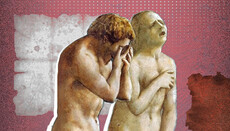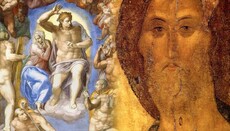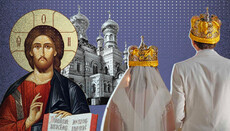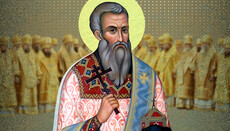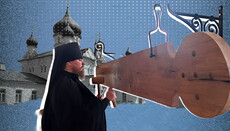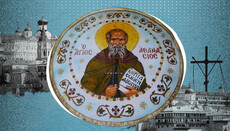“Picasso”: God Exists!
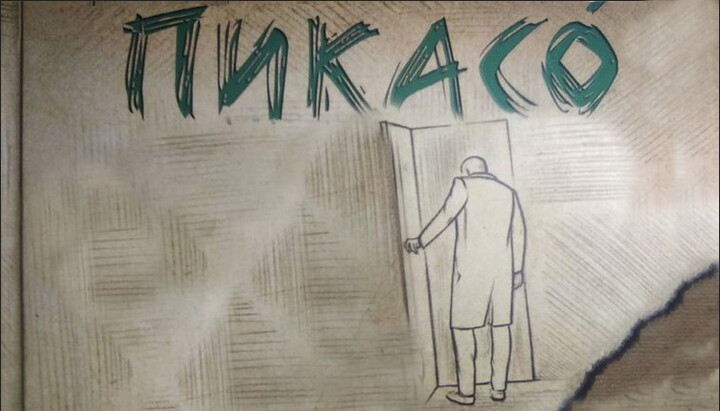
In the new year, the UOJ opens the column “Literary Notes”, which will publish excerpts from books by contemporary Ukrainian authors. Below is an excerpt from A. Vlasov, Picasso. Part One: The Slave. Episode 1.
Time: 1987
Place: Kyiv
Characters: Kirill Bulatov, Mikhaïl Kaminsky, both twelve years old.
The church door was open. Kirill stepped inside. A slow solitary walk, a book read to the very end, the midday heat—all this had left him in a slightly melancholy mood, which deepened the moment he crossed the threshold of the church.
The first thing he felt was the coolness, so desirable in the sweltering July air. The church seemed empty, and Kirill hesitantly walked further in. The interior was modest: a plank floor with paint worn away in many places, painted walls, icons in places framed with embroidered towels (rushnyky), dim, greasy candlestands with stubby extinguished candles and melted wax.
Kirill wandered along the walls, studying the icons, touched a candlestand with his finger, lifted his head to look at the ceiling. After all that, he thought perhaps it was time to leave.
“Yes, not exactly St. Volodymyr’s Cathedral,” flashed through his mind.
And yet he didn’t want to leave. Nothing special held him there, nothing especially interested him—he just didn’t want to go. Kirill sat on a bench by the wall and fixed his eyes on the single red flame of a lampada burning in the whole church.
Time passed—he did not notice how much. Only one thing he realized: his head, usually buzzing with thoughts, was now empty. Not a single thought intruded, something that had never happened before. And another thing—he felt as though he dared not move. Even to straighten his leg, which had grown numb under the bench, or turn his head slightly. Not fear exactly—he was not afraid—but the sense that any movement might disturb something. So he did not move. His leg, his arm, his head, even the thoughts in his mind—all were still. Only steady breathing and the measured beating of his heart broke the immobility. A silence descended, enveloping Kirill like a fog. Yet it was not empty silence—it was dense, alive, tangible, as if it could be touched.
More time passed.
Suddenly Kirill heard the faint creak of a door opening. Turning his head a little, he saw a boy of about his own age emerge from a side door in the iconostasis. In his hands he carried a small bucket and a brush, and he was wearing a blue work smock two sizes too big. He deftly gathered candle stubs into his bucket, then swept melted wax with the brush, moving from candlestand to candlestand. At first he did not notice Kirill. When he finally did, he gave a small start, cast a quick glance, and returned to his work.
Meanwhile Kirill’s mind began to stir again. He had not expected to see someone his own age in a church—much less some kind of church helper. School lessons in atheism came to mind. A boy! His age! Serving in church! It didn’t add up. Old women—that was understandable, naïve, benighted people. But a boy like Kirill, a Soviet pioneer who in the fifth grade already “knew all about life and its origins”—how could he be in church? Absurd! Did he not know there is no God?
Kirill stood and approached the boy, who looked up briefly, then continued sweeping.
“Hey, why are you in church? Do they pay you for this?” Kirill asked bluntly.
The boy said nothing. Kirill stared with mocking curiosity, as if from above, though they were the same height. The boy’s face betrayed confusion and hurt. The question had been asked half-mockingly, as if to laugh at his faith. He ought to defend it, to answer, but his thoughts scattered, words failed him. He fixed his gaze on the candlestand, his face reddening.
An awkward silence fell. Yes, Kirill’s question contained mockery and superiority—but he genuinely wanted to know why his peer was in church when he, Kirill, was not.
The boy remained silent. Kirill dismissively and turned to leave..
* * *
After he left, the boy abandoned the candlestand, shuffled over to the bench, and sank into the place Kirill had been sitting. His face burned, his temples pounded, tears threatened. He was mortified. He—a church altar boy, a priest’s son! And he could not answer the simplest question: “Why are you in church?”
Of course, he might have rattled off a phrase memorized from the Law of God: that the purpose of life is the salvation of the soul, salvation happens in the Church, therefore he was in church because he was being saved, and so on. But that wasn’t it. He knew it would only provoke more ridicule. Save from what? Life was beautiful—sunshine, the lake, the beach, ice cream, summer vacation. Then school, games, friends. And here he was, cleaning candlestands… fasting on Wednesdays and Fridays while others feasted… not accepted into the pioneers because his father was a priest, mocked by his classmates… forced into prayers when he wanted to sleep or watch television. Not like everyone else. For what?
The little altar boy got up, tried to shake off the thoughts, and returned to the candlestand. But his hands had gone limp, the work disgusted him. He set down the bucket and brush, climbed the steps to the choir loft, and sat down heavily.
“Why am I in church?” he asked himself. “For what do I deprive myself of everything the other kids enjoy? To earn the Kingdom of Heaven? But what is it? What do I expect to find there? Many children already have here what I dream about—without any ‘Kingdom,’ without church. And does it even exist? No one has seen it. What if our teacher is right—that there is no God, no Kingdom, just inventions of clergy to get money? After all, my father does collect money—for baptisms, for funerals, in the donation box. Is it really all for money?”
Confusion filled the soul of the twelve-year-old.
He was a priest’s son. From birth he had been immersed in church life—prayers at his mother’s delivery, baptism on the eighth day, churching on the fortieth, communion at every Liturgy, confession from age seven, serving in the altar from age five. His parents taught him the Gospel, the Law of God, the lives of the saints. He had grown up in church, never knowing another way. Yet in school he discovered a different world—and knew he was not like the others. He bore the nickname “Popovych” (“priest’s son”), yet he lived with a protective shell: “My world is right because it’s mine; theirs is wrong because it’s not mine.”
And now, from that “wrong” world, a boy like him had come and asked a single word: “Why?” And that little word shook the foundations of his borrowed faith. He understood: he must answer, not with rehearsed formulas, but as his own person.
Sitting in the choir loft, looking down on the church he knew so well, he suddenly saw it as a cage. Monotonous services, the same prayers, the same books. Boredom. Oppression. No answer.
He recalled sermons, religious books, the Gospel. Perhaps there? He searched his memory—Nativity, Sermon on the Mount, Judas’ betrayal, Golgotha, Resurrection.
“Yes, but what do they have to do with me? Long ago. If at all. Maybe it never happened?”
No answer.
He felt powerless. And he sensed that unless he found the answer, he would never return to church.
* * *
His footsteps echoed in the empty church as he descended. He glanced at the icon of Christ on the analogion.
“I must pray. If God exists, He will answer.”
He tried to recall prayers he knew almost by heart. But none fit. Words failed. Despair flooded him. And suddenly something within him broke, and he stopped noticing the world around. He walked straight into the altar, knelt before the Holy Table, and from the depths of his heart cried silently: “Where are You?!”
At that instant, deep within, came a quiet, gentle voice:
“Where are you?”
It was not an echo, not sound. It was an answer. His heart knew—this was God speaking.
“Where are you?”—as once He asked Adam in Eden.
“Where are you?!”—as his mother cried years ago, searching for him when he had hidden behind garages after breaking a chandelier with a football. When she found him, she hugged him, whispering in relief, “Found!” And he had felt that the worst punishment in the world was to leave his mother.
Now—“Where are you?”
“I am here, Lord. Here, in Your church. I never left,” Misha thought, shuddering at how close he had come to leaving—to losing faith, to forgetting God. He trembled at the abyss he had glimpsed: leaving God. Fear seized him, but it was not terror—it was the fear of God, awe before Christ’s loving question. He dared not move, dared not even pray. He simply felt the presence of the One he had doubted.
Time stopped.
Then he remembered Kirill—the boy who had asked “Why?” His heart ached. That boy had left. He must run, find him, tell him…
Misha rushed out of the church, fumbling with his oversized smock, flinging it aside, and raced down the path. At a fork—left to the tram, right to the lake—he turned right.
He caught Kirill by the water.
“Wait!” he shouted, breathless.
Kirill turned, astonished. The altar boy ran toward him—but it was no longer the timid, crushed child. It was someone transfigured, radiant. The change was so stark that Kirill even stepped back.
“Wait,” the boy gasped, still catching his breath. “I wanted to tell you… Listen—GOD EXISTS!” he blurted, looking straight into Kirill’s eyes.
Kirill shrank back. It felt as though he looked up at the boy from below. The altar boy’s eyes shone with a light not of this world—so bright that Kirill wanted to close his own.
He found nothing to say. Only shrugged and walked away.
To be continued…
